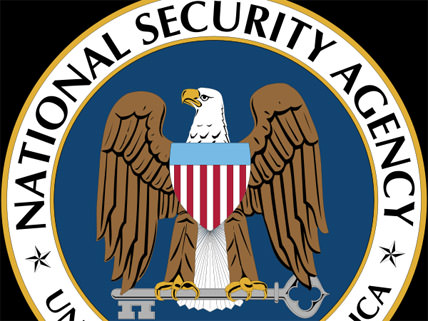Bipartisan Coalition For Anti-NSA Legislation Grows

The USA FREEDOM Act, which aims to rein in the National Security Agency (NSA), has a growing coalition of bipartisan support that includes Rep. Justin Amash (R-Mich.).
The full title—"Uniting and Strengthening America by Fulfilling Rights and Ending Eavesdropping, Dragnet-collection, and Online-Monitoring Act"—is a mouthful. But it aims to do exactly what it says. If passed, the bill could end bulk meta-data collection, require the attorney general to make certain Foreign Intelligence Surveillance (FISA) court decisions public, and allow Internet and telephone companies to disclose some information about FISA court orders they receive. Additionally, it would create a position within the FISA court of a "special advocate" to act "zealous and effective…in defense of civil liberties."
Support for the House bill, which was introduced in late October, has been spreading. The Grand Rapids Press reports that just since this weekend, the number of cosponsors jumped from 70 legislators to at least 102, with an even split between Republicans and Democrats. The act was introduced by Rep. Jim Sensenbrenner (R-Wis.), who wrote the PATRIOT ACT but has since changed his positon and considers it "excessive and un-American." His co-author, Sen. Patrick Leahy (D-Vt.), also previously supported the surveillance legislation, but now believes it does "not contain sufficient safeguards to protect… privacy and civil liberties."
Will Adams, a spokesman for Amash, explained the representative's reason for support for the act. "We think the American people want to rein in the NSA. They want their rights protected, they want their privacy protected from government surveillance," he said to The Grand Rapids Press.
This isn't Amash's first time taking on the data-gobbling agency. Earlier this year, the representative introduced the LIBERT-E Act, which sought less extensive changes than the USA FREEDOM Act. Its strategy was to defund meta-data collection, but the bill narrowly failed to pass in a House vote.
Derek Khanna points out that Sensebrenner's and Leahy's legislation has cosponsorship from a number of representatives who didn't even vote for Amash's bill. A range of organizations have also voiced their support. The American Civil Liberties Union (ACLU) lauds that the bill "ensure[s] that bulk collection doesn't just jump to another secret authority." The Electronic Frontier Foundation (EFF) is worried that the act "does not touch problems like NSA programs to sabotage encryption standards," but still supports it as the "best shot at fixing some of the worst problems with NSA surveillance."
Editor's Note: As of February 29, 2024, commenting privileges on reason.com posts are limited to Reason Plus subscribers. Past commenters are grandfathered in for a temporary period. Subscribe here to preserve your ability to comment. Your Reason Plus subscription also gives you an ad-free version of reason.com, along with full access to the digital edition and archives of Reason magazine. We request that comments be civil and on-topic. We do not moderate or assume any responsibility for comments, which are owned by the readers who post them. Comments do not represent the views of reason.com or Reason Foundation. We reserve the right to delete any comment and ban commenters for any reason at any time. Comments may only be edited within 5 minutes of posting. Report abuses.
Please to post comments


The USA FREEDOM Act
Jesus Christ you guys.
Freedom Act Patriot Act then. Must be something in the water that cause Congress to create high-sounding names for legislation.
Pretty sure this was intended to mock the USA PATRIOT Act.
In which case, give them some credit for their little joke.
Yes, they need to stop with the names, but, at least the bill is a start.
Whatever, I think it's a great idea. Use the same tactic as the statists. Like, who could be against the FREEDOM Act? Why do you hate FREEDOM?
Oh well, no more monitoring. There goes the sense of warm security knowing I'll never truly be alone. Sniffle. Cold. So cold.
I know it was only sarcasm, but that comment was the first thing to pull any sort of sympathy from my cold, dead heart in weeks.
Why would a new law be any better enforced than those already on the books?